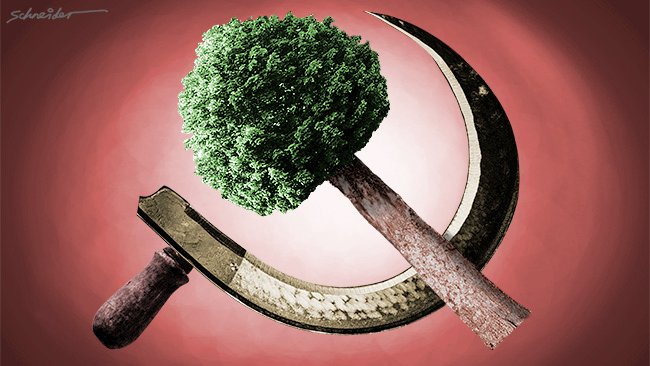
I really don't know, but even if there was I can see no reason why governments—of course huge polluters themselves as plunderers of stolen resources for their war machines and other such adventurism; a waste of resources that environmentalists should oppose—should step in to do something about it, especially in the form of "cap and trade" and other regulations that do nothing for the preservation of liberty—nor of actually protecting the environment.
It would seem to me the whole "green" movement is just an excuse to do evil things to us (like rob us more than they do already, spray chemicals on us out of planes, etc.) by a bunch of communists masquerading as environmentalists who desire the formation of a one world government where the use of all property and scarce resources are dictated by a single, central authority, led by so-called "experts", that presides over all of human life and land, rather than it being privately owned, i.e., the system of capitalism which they seek to destroy with statism.
We don't need environmental "regulations" or an EPA any more than we need a central bank to supposedly assure that no one does to us all the things that, well, it has came around to doing to us: inflation, fractional reserve banking, i.e., the things it was said the central bank was needed for.
A regulatory agency isn't needed; such things can be stopped under the legal principles of private property; bureaucracy is unnecessary.
It seems that it's assumed deregulation means a free-for-all for polluters to aggress against property owners, since this is probably actually what the Republican Party means by deregulation; they're socialists themselves, who don't have property rights in mind as does the libertarian. We should deregulate, however; but any deregulation should also be met with the enforcement of property rights, i.e., polluters should face consequences for violating others' property rights rather than deregulation being equated with "everyone can now violate anyone's property rights, since there are no regulations anymore."
A debate may ensue between minarchists and anarchist-libertarians over the best way to achieve this order, through a government that only exists to uphold property rights (though, when was one ever limited to this role?) or without any government whatever (where we defend our own property rights privately), but this nonetheless should be the goal.
What we do need, and what is a solution to the problem of pollution, is a protection of property rights; not their further expropriation under the guise of protecting the environment. There is no need for blanket legislation, arbitrarily decreeing "A can't do X with Y." All that's needed instead is for there to be clear, objective property rights, and for anytime they're invaded—by pollutants or aggressors—for this crime to be stopped or punished, with restitution payments or other forms of justice.
When something is socialized, the utilitarian approach is instead to allow for many property rights violations so long as they surmise that they've discovered a means of proving that it is for the "common good" in the end. No problem if A, the individual, is being affected; B, or "society", is benefiting as a whole by A losing his rights.
Remember, governments always need excuses to act. There must be an enemy to convince the public of for a war to be justified, or else the public will not go along with the war; and this patriotism is greatly needed. For the same to happen in regarded to the environment, they must manufacture an enemy to combat, "a warming globe where we're all going to melt unless government rises to the occasion", or how else would they get away with making laws that control the use of another's property?
Green is the new Red.
"through a government that only exists to uphold property rights (though, when was one ever limited to this role?)"
a government is needed to uphold property rights
huh looks like you failed tard lmao
Indeed. Have you read 'behind the green mask'? Its a good book to recommand, it talks exactly about what you said in your post.
I have not, but may take your suggestion. Thanks! These are more my suspicions, so thanks for some confirmation.
This post has been ranked within the top 80 most undervalued posts in the first half of Mar 10. We estimate that this post is undervalued by $1.19 as compared to a scenario in which every voter had an equal say.
See the full rankings and details in The Daily Tribune: Mar 10 - Part I. You can also read about some of our methodology, data analysis and technical details in our initial post.
If you are the author and would prefer not to receive these comments, simply reply "Stop" to this comment.